
EDMETIC
Scope & Guideline
Bridging the gap between education and digital innovation.
Introduction
Aims and Scopes
- Educational Technology Integration:
The journal emphasizes the integration of various technological tools, such as augmented reality, virtual reality, and digital resources, into educational practices, aiming to improve learning outcomes and engagement. - Digital Competence Development:
A core focus is on assessing and enhancing digital competencies among educators and learners, ensuring that all stakeholders are equipped to navigate the digital landscape effectively. - Inclusivity in Education:
EDMETIC addresses the needs of diverse learners, including those with disabilities or special educational needs, and explores how technology can facilitate inclusive educational practices. - Impact of Social Media and Online Learning:
The journal investigates the role of social media and online learning environments in shaping educational experiences, especially in the context of remote and hybrid learning models. - Critical Media Literacy:
There is a consistent emphasis on developing critical media literacy among students, particularly in relation to the consumption of digital content and its implications for learning and social interaction.
Trending and Emerging
- Augmented Reality Applications:
The increasing focus on augmented reality (AR) as a tool for enhancing creativity, language learning, and social skills development highlights its growing relevance in educational contexts. - Blended Learning Models:
Research on blended learning, which combines traditional and digital learning methods, is becoming more prominent, especially in the wake of the pandemic and the need for flexible teaching approaches. - Media Literacy and Critical Thinking:
There is a noticeable trend towards fostering media literacy and critical thinking skills among students, particularly in relation to digital content consumption and production. - Mental Health and Digital Education:
Studies examining the intersection of mental health and the use of digital platforms for education are emerging, emphasizing the importance of addressing psychological well-being in virtual learning environments. - Educational Equity and Access:
An increasing number of papers address issues of equity and access to technology in education, particularly for marginalized groups, reflecting a commitment to inclusive educational practices.
Declining or Waning
- Traditional Teaching Methods:
Research exploring conventional pedagogical approaches appears to be declining, as the journal increasingly prioritizes innovative and technology-driven methodologies. - General ICT Impact Studies:
While ICT remains a key theme, studies that broadly assess the impact of ICT without specific contextualization or application seem to be less frequent, suggesting a shift towards more specialized inquiries. - Static Digital Tools Usage:
Papers focusing solely on the use of static digital tools without integration into dynamic learning processes or pedagogical frameworks are becoming rarer, reflecting a move towards more interactive and engaging educational technologies.
Similar Journals
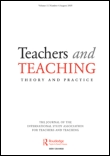
Teachers and Teaching
Inspiring Change in Educational MethodologiesTeachers and Teaching is a premier scholarly journal published by Routledge Journals, Taylor & Francis Ltd, providing an essential platform for researchers, educators, and practitioners in the fields of Education and Arts and Humanities. With an editorial focus on the dynamics of teaching and learning, the journal aims to share innovative research and insightful discussions that enhance pedagogical practices and policy development. Notably, it has achieved a Q1 ranking in both the Arts and Humanities and Education categories, signifying its impact and relevance in educational research, as reflected in its Scopus rankings, with an 84th percentile for Arts and Humanities and a 76th percentile in Education. Although it does not offer open access, the journal provides extensive access options for libraries and institutions, making its rich content available to a wide audience. Spanning from 1995 to 2024, Teachers and Teaching continues to set the standard for high-quality scholarship in the evolving landscape of education, inviting contributions that explore challenges and innovations in teaching methodologies.
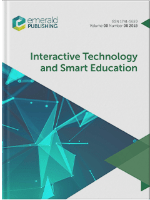
Interactive Technology and Smart Education
Transforming education through interactive innovation.Interactive Technology and Smart Education is a leading academic journal published by EMERALD GROUP PUBLISHING LTD, dedicated to exploring the dynamic intersection of technology and education. With a robust impact factor signifying its significant contributions to the field, this journal consistently ranks in the Q1 quartile in categories such as Computer Science (Miscellaneous), Education, and E-learning, reflecting its prestige and wide-ranging influence. A staple for researchers, educators, and industry professionals, the journal addresses innovative practices and developments in interactive technologies that enhance teaching and learning experiences. Operating from its base in the United Kingdom, the journal spans nearly two decades of impactful publishing, featuring high-quality research that plays a crucial role in shaping the future of education through technology. Scholars seeking to stay at the forefront of this evolving field are encouraged to contribute and engage with the journal's pioneering work.

ETR&D-EDUCATIONAL TECHNOLOGY RESEARCH AND DEVELOPMENT
Driving Educational Excellence in a Digital AgeETR&D - Educational Technology Research and Development, published by Springer, is a premier journal dedicated to advancing the field of educational technology through rigorous research and development. With a history dating back to 1957, it has established itself as a leading resource for scholars and practitioners, maintaining a remarkable Q1 ranking in Education as of 2023, and standing at an impressive 41st out of 1543 in the Scopus rankings for Social Sciences - Education, placing it in the 97th percentile. This journal aims to bridge the gap between theory and practice, offering in-depth insights into the latest innovations and methodologies in educational technology. As a vital resource for researchers, educators, and technology developers, ETR&D highlights the interplay of technology, pedagogy, and learning environments, driving the evolution of educational practices in a digital era. Although not an open access journal, it provides comprehensive access options for institutional and individual subscribers, ensuring that key findings reach a broad audience. Discover the future of education through ETR&D's influential publications.

Pixel-Bit- Revista de Medios y Educacion
Bridging Technology and Pedagogy for a Digital FuturePixel-Bit: Revista de Medios y Educación is an esteemed academic journal published by UNIV SEVILLA, EDITORIAL, dedicated to advancing the fields of media and education through rigorous research and insightful analysis. With its Open Access policy established in 2010, the journal ensures that the latest findings and methodologies are readily accessible to researchers, professionals, and students worldwide. Operating from Seville, Spain, Pixel-Bit has been recognized for its significant impact within its respective fields, achieving Q2 and Q3 rankings in multiple categories such as Computer Networks and Communications, Computer Science Applications, Education, and Information Systems as of 2023. Its Scopus rankings further reflect its influence, with notable placements in the 83rd percentile in Social Sciences - Education. This journal serves as a pivotal platform for disseminating knowledge, fostering innovative practices, and bridging the gap between technology and pedagogy in an increasingly digital world.
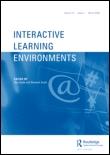
INTERACTIVE LEARNING ENVIRONMENTS
Empowering educators with cutting-edge interactive methodologies.INTERACTIVE LEARNING ENVIRONMENTS, published by Routledge Journals, Taylor & Francis Ltd, is a premier peer-reviewed journal that focuses on the intersection of technology and education, dedicated to advancing the understanding of interactive learning methodologies. With an impressive Q1 ranking in both Computer Science Applications and Education, as well as in E-learning, this journal stands out as an authoritative source of innovative research, ranking 28th in Education and 65th in Computer Science according to Scopus metrics. The journal's comprehensive scope covers a broad range of topics, from the effectiveness of haptic feedback in learning environments to the development of adaptive learning technologies, making it a vital resource for researchers, educators, and policy-makers alike. Although currently not an open-access publication, INTERACTIVE LEARNING ENVIRONMENTS provides readers with substantial insights and empirical findings critical for both theoretical and practical applications in the evolving landscape of educational technology.
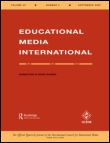
Educational Media International
Empowering educators with the latest in media research.Educational Media International, published by Routledge Journals, Taylor & Francis Ltd, is a premier journal in the interdisciplinary fields of Communication and Education, with a commendable Q2 ranking in both categories as of 2023. Established in 1978, this journal serves as a significant platform for the dissemination of innovative research that explores the evolving intersection of media technologies and educational practices. With an emphasis on both theoretical and practical applications, it addresses crucial topics such as digital learning environments, multimedia educational resources, and the impact of social media on education, making it an essential resource for researchers, professionals, and students alike. Located in the United Kingdom, Educational Media International not only contributes to the academic discourse but also reflects global trends and challenges in education, fostering a deeper understanding of the vital role media plays in shaping learning experiences worldwide.
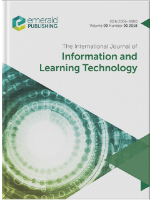
International Journal of Information and Learning Technology
Unveiling New Horizons in Information and Learning TechnologyInternational Journal of Information and Learning Technology is a pivotal publication in the fields of computer science and education, published by the esteemed Emerald Group Publishing Ltd. With an ISSN of 2056-4880, this journal has positioned itself as a valuable resource, reflecting a commitment to high-quality research and discourse in information technology and learning methodologies. Recognized for its significant contributions, it holds a respectable Q2 ranking in both Computer Networks and Communications and Computer Science Applications, along with a prestigious Q1 ranking in Education for the year 2023. The journal spans an expansive converged period from 2015 to 2024, providing an extensive archive of innovative ideas and findings that are instrumental to researchers, educators, and IT professionals alike. Although currently not open access, the publication remains vital to the academic community, ensuring that cutting-edge research and discussions continue to inform and inspire advancements in the integration of technology within learning environments. From its base in Leeds, United Kingdom, the journal invites submissions that explore the nexus of technology and education, fostering a deeper understanding of how digital innovations can enhance teaching and learning experiences.

RIED-Revista Iberoamericana de Educacion a Distancia
Empowering Distance Learning Through ResearchRIED-Revista Iberoamericana de Educacion a Distancia is a premier academic journal dedicated to the dynamic field of distance education, published by the ASOCIACION IBEROAMERICANA EDUCACION SUPERIOR & DISTANCIA - AIESAD. Established in 1998 as an Open Access journal, it provides a valuable platform for researchers, educators, and practitioners to disseminate and access cutting-edge research and innovative practices in distance learning. With its ISSN 1138-2783 and E-ISSN 1390-3306, RIED ranks within the top 2nd Quartile (Q2) in both Computer Science Applications and Education as of 2023, showcasing its significant impact and relevance in academia. Positioned in Spain, the journal not only serves the Ibero-American educational community but also contributes to the global discourse on online education methodologies and technologies. With an impressive Scopus ranking in the 92nd percentile for Social Sciences (Education) and 77th percentile for Computer Science (Computer Science Applications), RIED is essential for those seeking to advance their understanding and expertise in the realm of distance education.
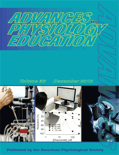
ADVANCES IN PHYSIOLOGY EDUCATION
Enhancing Engagement in Physiology EducationADVANCES IN PHYSIOLOGY EDUCATION, published by the American Physiological Society, is a leading journal dedicated to the field of physiology education, with a commitment to advancing teaching practices and pedagogical strategies in this vital discipline. Established in 1998, the journal has consistently provided a platform for original research and discussion, fostering the improvement of educational methodologies. With an impressive impact factor and ranked in Q2 for Education and Q3 for Physiology, it reflects a robust academic influence within the research community. The journal ranks #458 out of 1543 in Social Sciences - Education and #130 out of 193 in Biochemistry, Genetics, and Molecular Biology - Physiology according to Scopus, highlighting its critical role in shaping physiology education. While it operates on a subscription model, its focus remains on promoting innovative education practices that benefit both educators and students alike. This journal is essential reading for anyone looking to enhance their understanding of physiology teaching and learning.
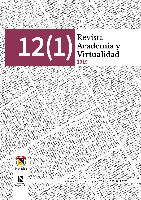
Academia y Virtualidad
Transforming Pedagogy: Where Academia Meets Digital InnovationAcademia y Virtualidad is a distinguished open-access journal published by UNIV MILITAR NUEVA GRANADA that has been disseminating innovative research since 2013. Focused on the intersection of education, technology, and digital transformation, this journal aims to provide a platform for scholars, educators, and practitioners to explore the implications of virtual environments in academic settings. Maintaining a commitment to rigorous peer review and scientific integrity, Academia y Virtualidad plays a vital role in advancing knowledge within the fields of educational technology and digital pedagogy. With its accessible online format and emphasis on contemporary issues, it caters to a global audience eager to engage with the latest trends and research outcomes that shape the future of education. Researchers, professionals, and students alike will find the journal an invaluable resource for staying informed about critical advancements and theoretical discussions in virtual learning and its applications.